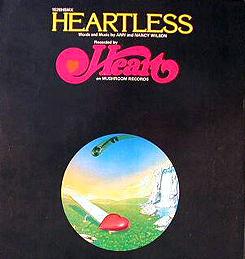| "Heartless" | ||||
|---|---|---|---|---|
 | ||||
| Single by Heart | ||||
| from the album Magazine [1] | ||||
| B-side | "Just the Wine" | |||
| Released | March 1978 (US) [2] | |||
| Recorded | 1976 | |||
| Genre | Hard rock | |||
| Length | 3:54 (Promo Version) 5:00 (Album/Single Version) | |||
| Label | Mushroom Records | |||
| Songwriter(s) | Ann Wilson Nancy Wilson | |||
| Producer(s) | Mike Flicker | |||
| Heart singles chronology | ||||
| ||||
"Heartless" is a song written and recorded by the rock band Heart in 1976 for their album Magazine . Issues with the band's previous record label Mushroom caused a delay in the album's release and "Heartless" was released as a single two years later, after the re-issue of their first single "Crazy on You". [3]